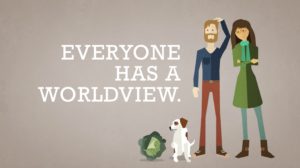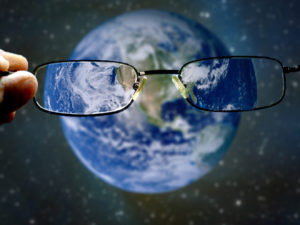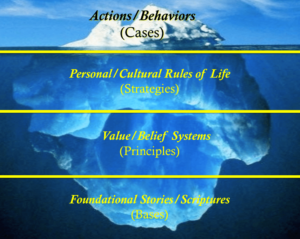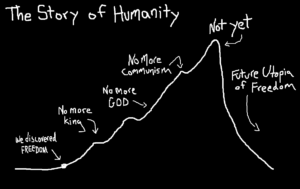
Everyone has a worldview
Few think about their worldview
Worldview is the “overall perspective from which one sees and interprets the world” (Wordnik). This standard definition has little meaning to the average person. I was not familiar with this term until about ten years ago and I have discovered precious few people who give any thought to their worldview. Yet, the worldview is the lens by which each person interacts with political, social and physical environment. Can you elucidate your worldview?

How Did your worldview develop?
What Issues does your worldview answer?
A Christian philosopher, Ravi Zacharias, postulated that a person’s worldview should answer these four issues to some degree: Origin; Meaning; Morality; and Destiny. I find that any discuss of worldviews becomes problematic because people really do not want to discuss the subject out of fear of being thought silly or weak.
I believe that everyone has some conception of how they believe the world works. The worldview is built the moment the person is born and never completed even at death. The understanding of one’s worldview is so innate that most people naively believe that everyone has their worldview. It is true that each local community, state government and even regional areas do have communal patterns of beliefs that contribute to one’s worldview. In addition, social relationships such as identity groups, school groups and religious affiliations also contribute to one’s worldview. Each layer appearing to add another layer of complexity making it nearly impossible for a person to thoroughly grasp their worldview position in general or on any specific topic. Identity affiliations become a major guidance source for one’s beliefs. If we were to stick to these vague imprecise definitions then no one would be able to understand or change their worldview. This is a preferable approach of many political entities who simply want you to vote their way without too much intervening thought. This simplistic approach has been encouraged by the professionals far too long.

Most of One’s Worldview
Is Hidden from everyone’s view
I am going to take a more simplistic approach to help us understand the importance of our various worldviews. Each person’s worldview is developed to demonstrate why that person is the hero/heroine of their life’s story. Paul uses the example of a judge who passes judgment on a convicted person even though the judge is also guilty of breaking the law (Ro 2:1-5). To Paul, the judge is a metaphor of each person. Everyone is conceived in sin and thus guilty before even committing a single expression of one’s innate sin (Ps 51:5). Paul has already proved that everyone is guilty of rejecting all knowledge of God. What may be known of God is revealed in each person exhibiting the same innate set of morals throughout culture and history {Do not lie, Do not steal; Do not murder; etc.}. In addition, the wondrous complexity of nature demands acknowledgment of God.
Man denies God as creator and substitutes elements of creation itself as its own creator. This has taken the form of mythologies, paganistic practices and even highly educated forays into evolutionary philosophy. All these deny God as creator and in the final analysis replace God with each person acting as the god of their own worldview. Lost people deny God even the universality of right and wrong is patently obvious down through history. By removing God man is forced to replace God with some other mechanism to legitimize one’s resulting morality. This is necessary if others are going to accept our version of what is right or wrong. This process began with Cain who applied the force of government to control person behaviors in order to maintain some coherent order within a given society. At Babel when the languages were changed {confused} people’s worldviews were also changed. Sinners abhor differences which forced these foundational societal groupings apart. As languages and beliefs further subdivided so also did divergent worldviews emerge.
Empires and kingdoms arose as each group sought to impose its worldviews {morality} on others with varying degrees of success. Some kingdoms lasted a generation while a few endured for over a millennium. Subsequent societies were formed from the fundamental views of several of these early societies; America being heavily influenced by Greco-Roman culture for example. Notice, each group considered itself to have the answer to morality and felt compelled to impose its morality onto others, usually by force. This groupthink worldview mentality is interesting but nor for our current discussion.

As each worldview iteration evolves the focus is away from God
People today receive their worldviews as they always have, from parents, societies, social affiliations, historical coherencies and even personal experiences. The above graphic celebrates the discovery of freedom. However, the term is never defined though everyone claims to understand what freedom is. Then various perceived barriers to freedom are systematically removed: kings {authorities}; God; social-economic barriers until the pinnacle is in sight. However, more work still needs to be accomplished, though that work also is never defined; yet, utopia is promised for some future time {usually never to be realized}.
The problem is thus: if you have not consciously developed your worldview then you are simply parroting only what you have been taught. It is your worldview but it bears little of you’re making. It has been knit together for you by the state, informal authorities, professional considerations religious affiliations etc. You believe you are exercising freedom of choice when in fact you are simply acting as you have been trained. The simply truth of the matter is that every lost individual has rejected God’s truth while substituting various explanations that appear coherent when in fact they bear little semblances with reality.
People may believe it is wrong to murder but their basis for this belief is not based on Scripture but on various degrees of conflation and logical fallacy that have no merit. This is expected in the lost. The problem is when the lost people become saved and reorder their worldviews along perceived Christian lines these are no more valid than their previous views. It is not enough to have correct beliefs; this is simply moralism. Christ wants you to understand not only what you believe but also why you have such beliefs. This is the fundamental reason Paul wrote the letter to the Romans. If you cannot give a biblical defense of your beliefs than how do you know they are biblical beliefs?
